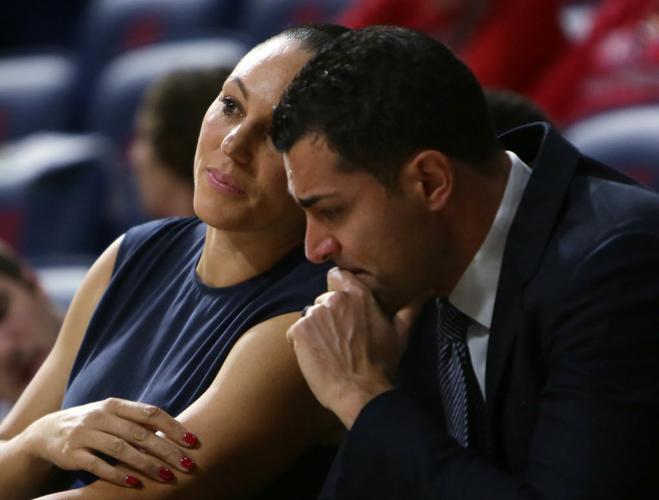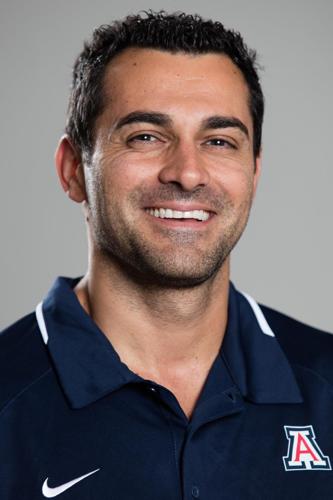Salvo Coppa says he’s fortunate. He shows it, too.
Coppa smiles as he helps run practice, grins when he huddles with the other coaches and practically beams when he talks about how his players are developing.
Coppa is a rare breed in coaching. From the beginning, he’s always followed his heart. The approach is how Coppa ended up at the UA, serving as an assistant coach for a women’s basketball team coached by his wife, Adia Barnes.
“Going to the gym, it’s not a job. It’s a pleasure,” said Coppa. “I love going to work and having fun. I feel so blessed — of course, it’s a little less fun when we lose.”
Losing isn’t something Coppa experienced much of as a top international coach, winning three gold medals. He led Malta’s U18 Women’s team to its first European Championship in 2007, and the Sicilia women’s basketball team to a FIBA Island Games title in 2010. He coached Thailand’s women’s national team to a South-Eastern Asian Games title in 2011, the team’s first crown in 16 years.
Coppa coached Trogylos Priolo Junior Team in Italy to five straight Regional Championships and went to the state finals in 2008 and 2011. And, while associate head coach for Trogylos Priolo, a Professional Italian Club, he helped lead the team to five playoff appearances in seven years, including one finals appearance.
He also helped lead the team to the quarterfinals of the FIBA Cup in 2006.
Coppa would probably still be in Europe had Barnes not been offered a job as an assistant coach at Washington 2011. Barnes was planning to move to Italy at the time.
Coppa took a leap of faith and followed his fiancee to the United States. They were married a year later.
“He had a three-year contract and sacrificed a lot to be here for me; it’s why I love him so much,” said Barnes. “He is a good man, a good coach and a good father. He has such good qualities. I’m not just saying that because he is my husband. I’ve known this about him since we met.”
Coppa was admittedly nervous about the move.
“I was comfortable with my life, my job and Adia asked me to move to the United States,” he said. “It was easier for me as I knew English, than for her to get a job in Italy. I took a conscious risk and I was scared at first. This country is different and I wondered if I would make it. But, at the same time we decided to do this. I was very lucky. In the end, what is important is that we are here, both of us having great opportunities in a wonderful environment.”
As a coach, Coppa had to adjust. European officials allowed more physical defense, while American rules favor scoring.
Moving from the professional ranks to college was different, too. Coppa must now navigate the NCAA rulebook and recruiting.
“In Europe there is a freedom that you can practice anytime, year-round, without limits. You are focused more on the court. There you work an-hour-and-a-half in the morning on fundamentals and two-and-a-half hours on tactics or five-on-five. The players there are paid and considered professionals,” he said. “Here the athletes are not paid. It’s a different system. In Europe you call her and tell her ‘this is what we’ll give you to play’ and it’s over. Here you start talking, wooing, and build relationships. It’s long and very formal.”
Coppa’s connection to the game goes deep. His father, Santino, is a legendary European women’s basketball coach. Salvo spent his childhood with the team. He began playing at age 7 and continued through college.
Yet Coppa wasn’t sure if he would end up in coaching. He majored in advertising and public relations in college. Yet when a spot came up to coach, he grabbed it. It didn’t take long for Coppa to realize his calling was to help develop young women’s players.
“He has a great basketball mind,” Barnes said.
“He has a lot of experience as a head coach developing talent and has gone through the process of building a team up. He is great at fundamentals and game tactics. He loves coaching and basketball.”
Coppa climbed the ladder stateside, spending one year at Montana State and time as a consultant with the Seattle Storm. He said the move to Tucson, and working for his wife, has been “a piece of cake.”
The weather is similar to that of his home in Italy, the people are friendly, and his wife and son are here. And when there are disagreements in meetings, Coppa rolls with it.
“I have no problem with disagreeing, it’s all part of brainstorming,” said Coppa. “It’s part of growing as a coach. If we were always on the same page all the time, there would be no new ideas.
“But the moment the doors open, we are all on the same page. We all do a good job of this. We all want to win and give it our best. So if someone has a good idea, why not?
“My role is being a really good assistant coach. I’m doing my best to recruit good people, people that have talent and people who will work hard. And, another important role is being a stress reliever for the head coach. I hope I help do that.
“My focus is being the best assistant coach I can be. I come to the office and Adia is my head coach and I am her assistant coach. It’s natural.”





